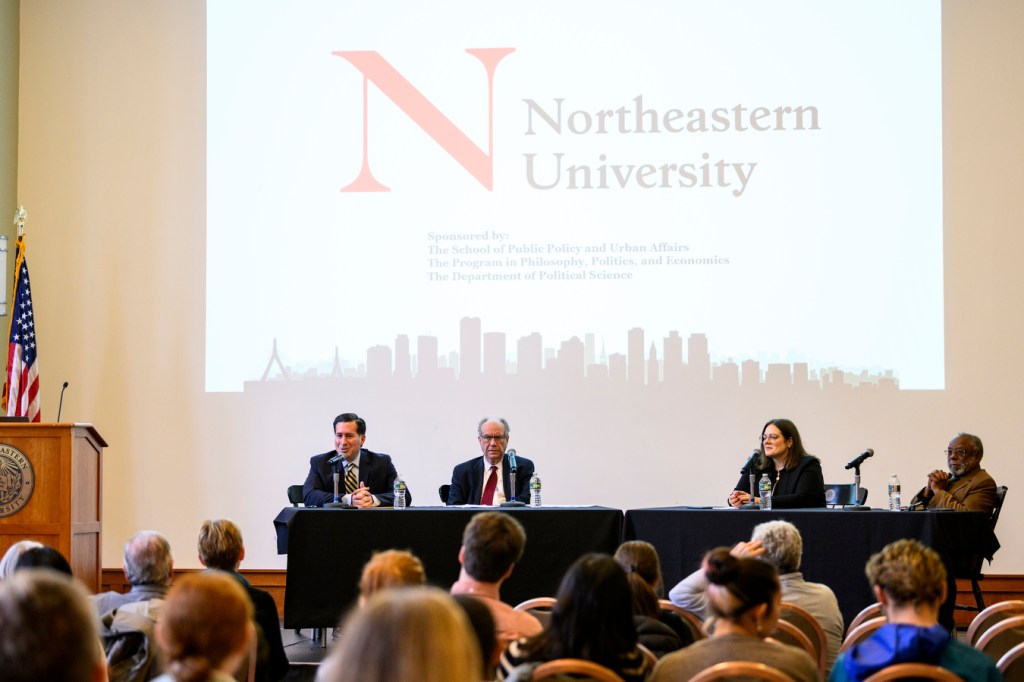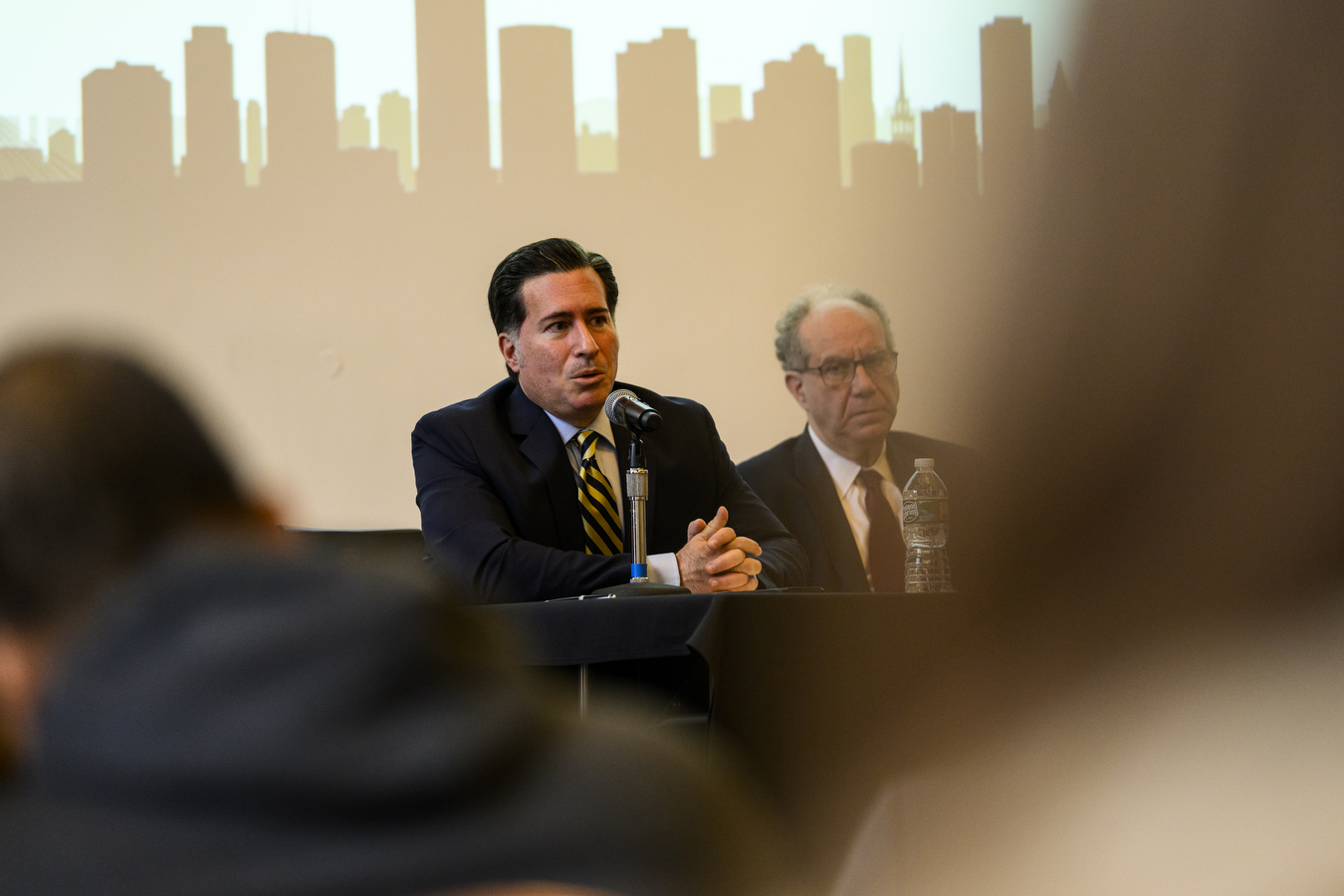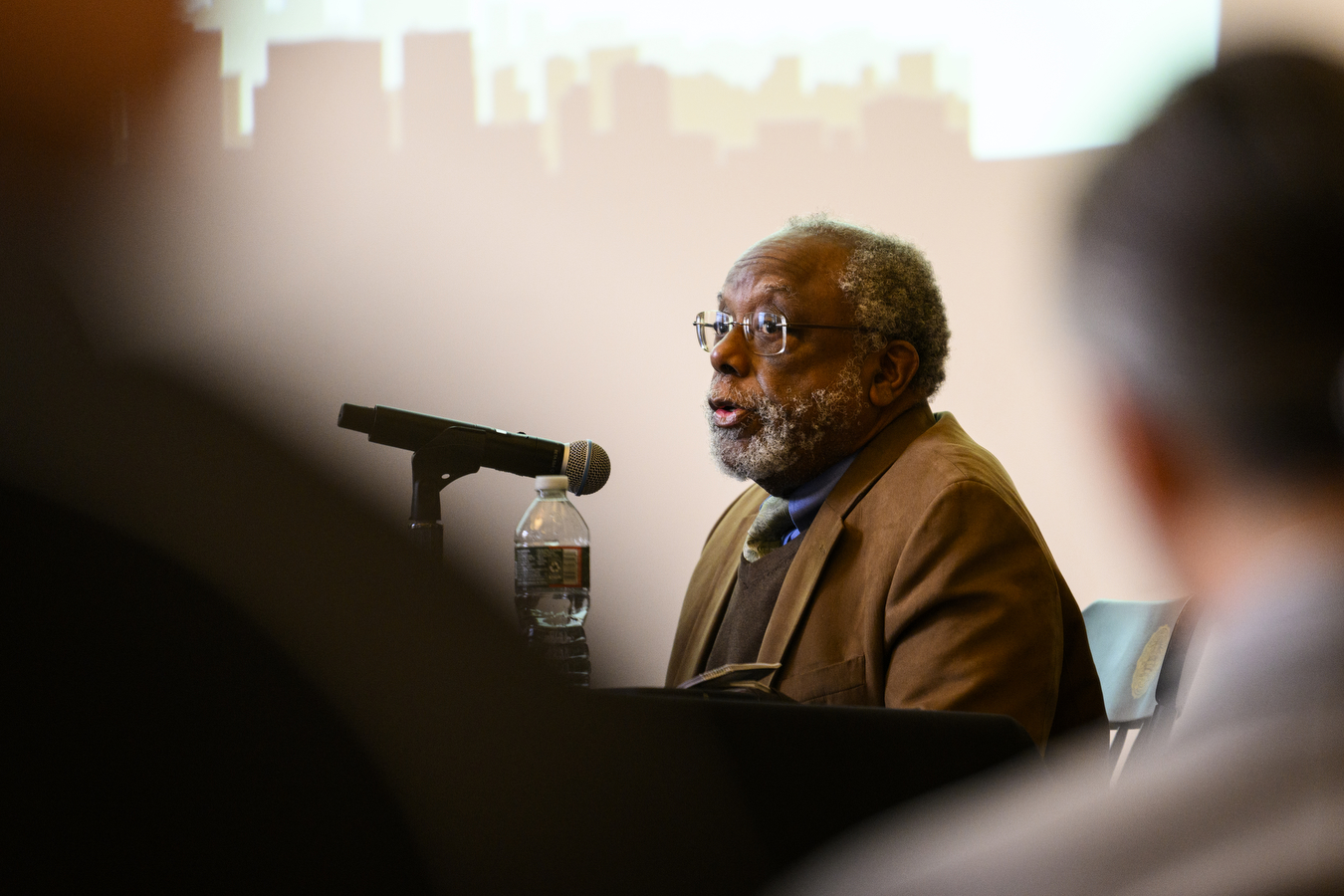After the midterms, don’t expect Democrats and Republicans to work together, Northeastern panelists suggest

The 2022 midterm elections were in many ways historic, a panel of Northeastern experts concluded, but Donald Trump still looks like a possible Republican presidential nominee in 2024, while Democrats need to focus on better communicating their policy victories to the voters.
An assembly of Northeastern experts sat down recently to share reflections on the 2022 midterm elections, the forces that affected the results and what the outcomes meant for America going forward.
Moderator Costas Panagopoulos, chair of the political science department, described the results of the recent midterm election cycle as historic and humbling in many ways. He noted the voters chose to elect a record number of women governors, a record number of openly LGBTQ candidates, more Black Republicans for Congress than any time since 1877, a record number of Latinos and Latina women in Congress, the first Generation Z congressman, the first transgender state legislator in New Hampshire, and so on.
“These are unprecedented moments for American politics,” Panagopoulos said, adding that they might have not received the attention they deserved.
Still, the panel didn’t expect this new partisan composition of Congress to help with more compromise and bipartisan cooperation to deliver for the American people.
“I don’t think that the parties are going to work together. I would be stunned if that were to be the case,” said Ted Landsmark, distinguished professor of public policy and urban affairs and director of Kitty and Michael Dukakis Center for Urban and Regional Policy.
In his opinion, there is not going to be a lot of legislation put forward by the Democrats in the next two years to avoid fruitless confrontation, as Republicans control the House and Democrats the Senate.




“These next two years are going to be spent trying to realize the accomplishments of the Biden administration over the past couple of years with a strong focus on the environment, resilience and issues of equality,” he said.
Landsmark also expects more organizing on the ground level to elect people who can begin to propose a more fundamental legislative change, he said. It will be crucial for the Democrats to demonstrate the results generated by the legislation that has already been passed, especially in key states like Pennsylvania and Michigan, and that there is real work being done on the inflation issues and for continuation of low unemployment levels.
On the judicial side, since Democrats were able to preserve control over the Senate, President Biden will continue to be able to have his federal judge picks confirmed, said Jeremy Paul, professor of law, which is the biggest impact of the recent election in his opinion. But the Georgia runoff will determine whether it is going to be a faster and smoother process.
“President Biden has already appointed more judges in his first two years than any president since John Kennedy, including Ketanji Brown Jackson,” he said. “It’s a huge thing that the Democrats continue to control the Senate in case there were to be another Supreme Court vacancy.”
The Supreme Court will continue to render important decisions, because it has a lot of important cases in front of it, Paul said, but he hoped that this election cycle, after the Dobbs v. Jackson Women’s Health Organization decision, demonstrated to the justices that if they push too hard, they are going to cause more backlash at the ballot box.
The single most threatening Supreme Court decision could be in a case where the Republican Party of North Carolina argues that the state courts and the state governor should have no role in setting up congressional and state legislative districts, Paul said, and that it should be entirely up to the state legislature.
“If the court rules that way, it will mean that any state that’s controlled by a Republican legislature will be able to do any gerrymandering that they want, any election rules that they want,” he said. “And this really will threaten democracy.”
Sarah Riccardi-Swartz, assistant professor of religion and anthropology, brought the panel’s attention to the importance of aesthetic and styling of conservatism that recent elections showed. Outspokenly extreme Republican candidates lost, while candidates with similar platforms but more careful presentation won, she said.
“That’s important to keep in mind as we go forward, how the aesthetic styling of conservatism will change and be rebranded,” she said.
Riccardi-Swartz also pointed out anti-democratic spirit in state legislatures, like in Texas where bills were introduced last week to withdraw gender affirming care for trans and LGBTQ youth.
Panagopoulos went one level further. He said that local elections of officials across the country, starting with school boards have become incredibly politicized.
Answering a question from the audience, the panelists largely agreed that Donald Trump very likely might end up being the Republican nominee for the 2024 presidential race.
“He’s still very popular in the Republican Party, and, in particular, in the Republican base,” said Panagopoulos. “Right now, he’s going into that race very, very strong.”
He said that about 10% of the Republican Party are the “never Trumpers,” 40% – the “always Trumpers,” but the remaining 50% could be persuaded to support him.
“There’s a solid argument to be made for Trump being the nominee,” Riccardi-Swartz said. “It depends on who he picks as his running mate.”
Choosing a more moderate conservative pick would allow him to bolster his support among moderates, she said, while picking someone like U.S. Rep. Marjorie Taylor Greene, a Republican from Georgia, or J.D. Vance, a Republican from Ohio recently elected to the House of Representatives, would show a shift farther to the right.
The early stages of the campaign are going to be a bloodbath with a lot of dirt and aggression, said Landsmark. In his opinion, Sen. Ted Cruz is the only Republican with the chutzpah and the seasoning to step forward as a standard bearer for the GOP.
“He would then choose as a running mate a former governor from South Carolina or Louisiana, or one of the other southern states,” Landsmark said.
Paul pointed out that Trump sounded incoherent on Tuesday night during his 2024 campaign announcement from his Mar-a-Lago resort in Palm Beach, Florida, but he has proven his ability to generate hysteria among a huge number of people.
“It would be crazy to bet against Trump,” Paul said.
The panel was hosted by Maria Ivanova, director of the School of Public Policy and Urban Affairs and professor of public policy, and Adam Hosein, associate professor of philosophy and affiliate professor of law and director of the Politics, Philosophy, and Economics Program.
For media inquiries, please contact media@northeastern.edu.






